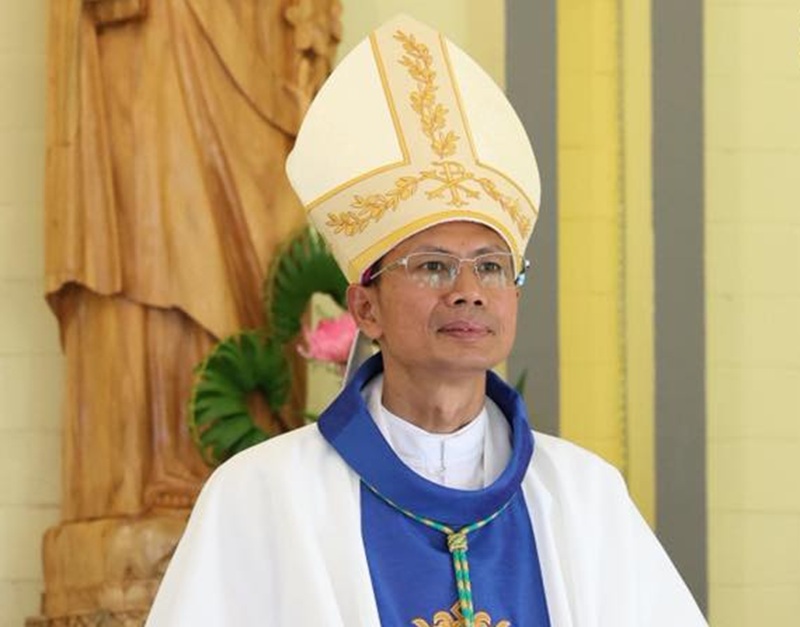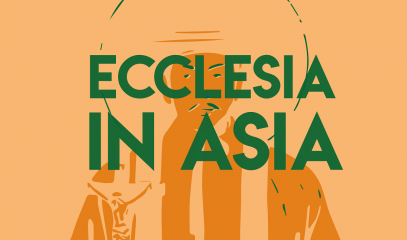Bishop Suon Hang Ly: “Cambodian Christians part of today's Phnom Penh”
The new coadjutor apostolic vicar of the Cambodian capital, appointed yesterday by Pope Leo, tells AsiaNews about the challenges facing the tiny local Church reborn after the persecution of the Khmer Rouge, who fifty years ago also killed Msgr. Samar, the only local bishop before him. The legacy of the martyrs, inculturation, encounter with Buddhists, but also individualism brought about by the spread of digital devices are among the pastoral priorities.
Milan (AsiaNews) - Pope Leo XIV yesterday made a very important appointment for the small Catholic Church in Cambodia: he appointed a local priest, Msgr. Pierre Suon Hang Ly, as coadjutor apostolic vicar of Phnom Penh. Fifty-three years old, a priest since 2000 and currently apostolic prefect of Kompong Cham, he will therefore join the French Monsignor Olivier Schmitthaeusler, a missionary of the MEP, in his ministry, with the prospect of taking over the reins in the not too distant future and being ordained bishop. In this way, the Church in the Cambodian capital will once again have a local pastor, after the only previous one, Msgr. Joseph Chhmar Salas, who was ordained in dramatic circumstances in April 1975 and died two years later during the persecution of the Khmer Rouge. Below we publish a testimony sent to AsiaNews by Msgr. Suon Hang Ly on his ministry and the challenges facing the Church in Cambodia today.
The Catholic Church has been present in Cambodia since the 16th century. In 1968, Pope Paul VI organised it into three jurisdictions: the apostolic vicariate of Phnom Penh and the two apostolic prefectures of Battambang and Kompong Cham. Despite this long history, however, our Church is still young and small. Young because it was severely wounded during the Khmer Rouge period and rebuilt starting in the 1990s. Small because it has only 23,207 faithful, or 0.13% of the population of a country where 96.49% are Buddhist, 2% Muslim and 1.38% belong to other religions.
In this small Church, priests and religious come from different backgrounds. Most of the faithful are of Vietnamese origin, while Cambodians represent only 30% of the members.
My ministry
In October 2022, I was appointed apostolic prefect of Kampong Cham and now coadjutor apostolic vicar of Phnom Penh.
This appointment is a sign of progress for the local Church, but also a pastoral challenge. I often ask myself: what must we do to lead our Church well?
Fortunately, I can exercise this ministry thanks to the help of the universal Church and all Christians. I am fortunate to have missionaries who help us: the Foreign Missions of Paris, Korean missionaries, PIME, Indians...
In addition, in Kampong Cham, the priests on my council have helped me with important decisions. I feel that everything is guided by the Good Shepherd.
The apostolic prefecture of Kompong Cham, which I have led, comprises eight provinces, organised into four pastoral zones. It has 32 parishes. The largest is a Vietnamese parish located in Neak Loeung. Next are Bousra, a parish of the Phnong ethnic minority, and then Kdol Leu, a Cambodian parish. The other parishes have between 5 and 80 faithful. There are 21 priests of different origins: four Khmer (including myself); three French; one Italian; four Indian; four Korean; one Colombian; one Ecuadorian; one Filipino and one Malaysian. Currently, two religious communities are active in the prefecture: the Lovers of the Cross of Kompong Cham, a local community with nine Cambodian sisters, assisted by four Vietnamese sisters. There is also a community of Salesian sisters, with two sisters working with the Phnong people in Mondulkiri.
Despite the small number of Christians, the Catholic Church is very active in education and in assisting the sick and poor. We have four high schools, about twenty nursery schools and 11 homes for young people in various parishes.
The main challenges
The Catholic Church in Cambodia faces numerous challenges in its pastoral work, not only because of the small number of faithful, but also because of the rapid spread of modern technological devices. Drug trafficking is driving young people to abandon their studies, and we cannot remain silent about the problems related to immigration and trafficking in persons seeking work, both in Cambodia and abroad.
Fortunately, the government allows us to practise our religion freely.
The priests come from very different cultures, which makes it difficult to work together. They have to adapt to the Khmer culture in order to proclaim the Good News, incarnating themselves as Jesus in humanity.
It is difficult to convert Cambodians to an authentic faith in Jesus Christ. Many Christians no longer attend church because they have migrated for work or because of parish conflicts.
New technologies attract people to material goods, making it difficult to engage young people and find volunteers.
People close themselves off and no longer want to share their possessions.
Missionary work
In a predominantly Buddhist context, mission is not limited to prayer or Mass in church. Charitable work is essential: it attracts Buddhists and encourages them to seek Christ. Priests must visit Christians and parishioners: they therefore have both an ecclesial and a social role.
Fifty years after the arrival of the Khmer Rouge in Phnom Penh, many painful memories remain in our minds. The Church in Cambodia remembers those who died and suffered during that period and prays for them. But this memory is fading today because the elderly are fewer in number and young people are not very interested in that past. Many Khmers are concerned about their daily lives: they are in debt, looking for work abroad or moving to other cities.
The Church has played an important role in the reconciliation and healing of survivors. It has offered psychological and spiritual support; above all, it has brought Jesus' message of love, forgiveness and brotherhood. Prayer and meditation ease the heart. We do not forget the suffering, but we try to forgive those who have hurt us.
The death of Pope Francis and the beginning of the pontificate of Leo XIV
The death of Pope Francis also deeply saddened us Cambodian Catholics. During the mourning period, we organised prayer vigils and memorial Masses in all parishes. On 26 April, we participated in a large Mass in Phnom Penh organised by the three ecclesiastical districts of Cambodia. Pope Francis left us a rich legacy: synodality, peacebuilding, interreligious dialogue and protection of creation as our common home. I expect Leo XIV to continue the work of his predecessor and to guide our Church in the current context.
* Coadjutor Apostolic Vicar of Phnom Penh
07/02/2019 17:28
24/10/2019 17:56








.png)










